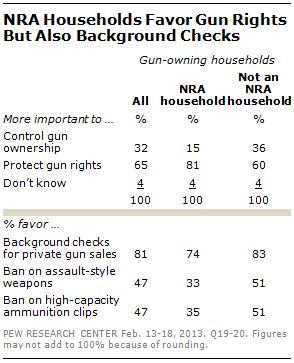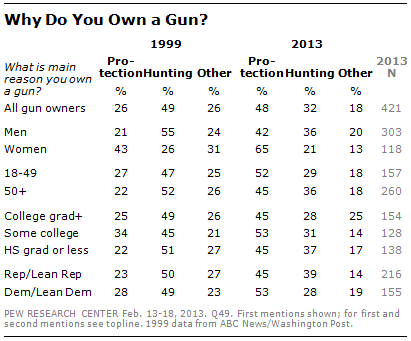 People in non-gun-owning households have more positive views about the possible impact of stricter gun laws than those who live in a household with a gun.
People in non-gun-owning households have more positive views about the possible impact of stricter gun laws than those who live in a household with a gun.
Majorities of those in non-gun households say that stricter gun laws would reduce deaths from mass shootings (66%) and accidents (65%), and would keep guns away from criminals (63%).
However, many people who do not have guns at home are also sympathetic to the potential downsides of gun control legislation. Nearly half (49%) of those in households without guns say that stricter gun laws would give the government too much power over average citizens. A majority (55%) say that stricter gun laws would make it more difficult for people to protect their homes and families.
Few gun owners believe that gun control efforts would be effective. They largely reject the assertions that stricter gun laws would reduce deaths from mass shootings and accidents or would prevent criminals from obtaining guns.
And a large percentage of gun owners (68%) say that stricter laws would give the government too much power over average citizens, while nearly as many (64%) say they would make it more difficult for people to protect their homes and families. However, gun owners are somewhat more skeptical that stricter laws would ultimately lead to guns being taken away from all citizens (51% agree).
Those who do not own guns, but live in a household with someone who does, mostly agree that stricter gun laws will make protection more difficult (58% agree) and give the government too much power over citizens (59% agree). Yet about half say that stricter laws would reduce deaths from accidents (50%) and mass shootings (48%).
Views of Gun Policies
 An earlier report on this survey, released in collaboration with USA TODAY, detailed public attitudes about gun control and specific gun policies. (For more, see “If No Deal Is Struck, Four-in-Ten say Let the Sequester Happen,” Feb. 21, 2013.)
An earlier report on this survey, released in collaboration with USA TODAY, detailed public attitudes about gun control and specific gun policies. (For more, see “If No Deal Is Struck, Four-in-Ten say Let the Sequester Happen,” Feb. 21, 2013.)
Gun owners overwhelmingly say it is more important to protect gun rights than control gun ownership (70% vs. 27%). People who do not own guns, but live in a household with a gun owner, are more evenly divided: 53% say it is more important to protect gun rights while 42% say it is more important to control gun ownership. By more than two-to-one (66% to 30%), those in households with no guns prioritize controlling gun ownership over protecting gun rights.
Among specific gun policy proposals, there is broad support in each of these groups for making private gun sales and sales at gun shows subject to background checks. Nearly eight-in-ten (79%) gun owners favor background checks on private gun sales, as do 86% of others in gun households and 85% of people in non-gun-owning households.
Other policy proposals are more divisive. Most gun owners (55%) oppose a ban on assault-style weapons while 43% favor such a ban. Similarly, 57% of gun owners oppose a ban on high-capacity ammunition clips that hold more than 10 bullets; 41% favor this proposal.
Majorities of those in gun households who do not personally own guns favor both of these proposals (55% favor a ban on assault-style weapons, 58% favor a ban on high-capacity ammunition clips). Among those in households that have no guns, 65% favor a ban on assault-style weapons while 59% favor a ban on high-capacity ammunition clips.
NRA Households: Staunch Opponents of Gun Control
 About one-in-ten Americans (9%) say that they or someone in their household is a member of the NRA. Among households that own guns, 21% say they personally (11%) or someone else (10%) belong to the NRA.
About one-in-ten Americans (9%) say that they or someone in their household is a member of the NRA. Among households that own guns, 21% say they personally (11%) or someone else (10%) belong to the NRA.
Those in NRA households are even less supportive of gun control than are people in other gun-owning households. Just 15% of those in NRA households say it is more important to control ownership while 81% prioritize protecting gun rights. Among gun-owning households in which there are no NRA members, 36% say it is more important to control gun ownership, compared with 60% who say protecting gun rights is more important.
Only about a third of those in NRA households favor bans on assault-style weapons (33%) and high-capacity ammunition clips (35%). Roughly half of those in other gun-owning households favor these proposals (51% each).
Yet people in NRA households overwhelmingly favor making private gun sales and sales at gun shows subject to background checks: 74% favor this proposal while just 26% are opposed.
Why Own a Gun? The Reasons Have Changed
 Those who say they personally own a gun, rifle or pistol are overwhelmingly white (82% white non-Hispanic) and male (74% are men while 26% are women).
Those who say they personally own a gun, rifle or pistol are overwhelmingly white (82% white non-Hispanic) and male (74% are men while 26% are women).
Among gun owners, the reasons for owning a gun have changed. Currently, 48% say the main reason they own a gun is for protection while 32% cite hunting and 18% give another reason. In a 1999 ABC News/Washington Post survey, 49% of gun owners cited hunting as the main reason for owning a gun while just 26% said they primarily owned a gun for protection.
The share of gun owners citing protection as the main reason they own guns has increased among all sub-groups of gun owners – men and women, older and younger gun owners and those with different levels of education. As was the case in 1999, women are more likely than men to say they own a gun for protection. In the current survey, 65% of women gun owners cite protection as the main reason they own a gun, compared with 42% of men gun owners.
An overwhelming percentage of women gun owners (80%) say that having a gun makes them feel safer; about the same percentage of men gun owners (79%) express this view. However, women are less likely than men to say than owning a gun is something they enjoy (63% of women vs.83% of men).
Most in Non-Gun Households Would be Uncomfortable Having a Gun
 Most people who do not have a gun in their household say that having a gun is something that would make them feel uncomfortable. Nearly six-in-ten (58%) in non-gun households say they would be uncomfortable having a gun while 40% would be comfortable.
Most people who do not have a gun in their household say that having a gun is something that would make them feel uncomfortable. Nearly six-in-ten (58%) in non-gun households say they would be uncomfortable having a gun while 40% would be comfortable.
Some of the same partisan and demographic differences in gun ownership are mirrored in the views of people in non-gun-owning households about having a gun. Just a third of women (33%) without a gun in the home say they would be comfortable having a gun; that compares with nearly half of men (49%) in non-gun-owning households.
Nearly twice as many Republicans as Democrats in non-gun-owning households say they would be comfortable if there were a gun in their home (58% vs. 30%).
People under 30 are somewhat less likely than older Americans to own a gun: 16% say they personally own a gun, rifle or pistol compared with 30% of those 50 and older.
But among those in non-gun-owning households, 55% of those younger than 30 say they would be comfortable having a gun their home. Far fewer people in older age groups express comfort with having a gun in the home.


